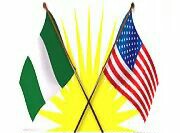Nigeria and the United States are likely to discuss the immigration visa restriction on the country on Monday at the Bi-National Commission meeting in Washington D.C.
Foreign Minister Geoffrey Onyeama and his inter-agency delegation will attempt to reverse the restriction which is planned to take effect on February 21.
The other countries on visa restriction are: Myanmar, Eritrea, Kyrgyzstan, Sudan and Tanzania.
Acting Secretary of the U.S. Department of Homeland Security, Chad Wolf, said the new immigration restrictions were designed to “address security concerns in the way the banned countries track their own citizens, share information with the U.S. and cooperate on immigration matters”.
Nigerians and nationals of other affected countries would not be allowed to apply for visas to immigrate to the US under the policy designed to “tighten security for countries that don’t comply with the U.S. minimum security standards or cooperate to prevent illegal immigration”.
The new restriction would apply only to new visa applications as immigrants issued valid visas before that date will still be able to move to the U.S.
Read Also: US Congress moves to nullify visa ban on Nigeria, others
Established 10 years ago, the Bi-national Commission is the premiere platform of engagement between Governments of the U.S. and Nigeria to expand cooperation and advance shared goals.
Mr. Ferdinand Nwonye, Ministry of Foreign Affairs’ spokesperson, at the weekend said: “Deliberations at the session will focus on areas of mutual interest, including good governance and anti-corruption, trade and investment, development and food security and security and counter-terrorism efforts.
“The BNC has continued to serve as a veritable mechanism for sustained bilateral high-level dialogue to promote and coordinate diplomatic, economic, military, technical, cultural and social cooperation between Nigeria and the U.S.”
It was learnt that the Federal Government has opened talks with some U.S. diplomats and officials on how to vacate the sanction.
There were indications that the ban was imposed by the U.S. following de-marketing shuttles by three Nigerian leaders.
Some Federal Government officials, and a few respected cabinet members, are the arrow head of the lobbying by the Federal Government in the last 48 hours, it was learnt.
The government officials have used the opportunity to “lay the cards on the table on why there was no basis for including Nigeria in the immigrant visa restriction list.”
According to investigation, although the U.S. officials and diplomats restated their country’s commitment to a “a very strong relationship with Nigeria, a major concern was only “about the fight against terrorism.”
A top source, who spoke in confidence, said: “The Federal Government has opened talks with strategic U.S. officials and diplomats on the need to review the immigrant visa restrictions imposed on Nigeria.
“The government is lobbying by presenting facts and figures to enable the U.S. to appreciate the position of the country.
“So far, we have had mutual talks with some of these officials and diplomats. By the time we sustain the lobbying in the next few weeks at home and abroad, we are hopeful of a review.
“I think, the situation is not as bad as being painted. A major concern of the U.S. is about the fight against terrorism.
“On our part, we will ensure that the mandate of the Presidential Committee, headed by the Minister of Interior, Rauf Aregbesola, is realised. Whatever we are expected to put in place will be done.”
Responding to a question, the source added: “We have decided to begin lobbying in earnest to stave off the ban because we do not want other countries to engage in such a restriction in a subtle manner.”
Another source added: “As part of the countdown to the 2019 poll, these leaders went on damaging shuttles against Nigeria. And the restriction is the consequence of their missions to the U.S..
“These three leaders separately met a powerful lobbying group in the United States which influenced the immigrant visa ban.
“We are working round the clock to change their narratives. By the time the U.S. Government get the true picture of the situation in which we are, they will appreciate what we have done.”
A different source however alleged that” diplomatic sources confirmed that the U.S. government had discussions with Abuja for two years over passport control, issuance and security around immigration. Six months ago, it told our diplomats in US that it was going to ban us, we did nothing!
“There are reports within diplomatic circle that terrorists who enter Nigeria from Mali through northern Nigeria are issued Nigerian passports that they use to fly to Yemen and elsewhere for terrorism training. The Buhari free-visa passes at our airport, I’m told, tipped the balance against us.”
One of the expectations of the meeting, will be the signing of a pact for the repatriation of $321million looted by a former Head of State, Gen. Sani Abacha.
This will be done on behalf of the government by Attorney-General of the Federation and Minister of Justice Abubakar Malami. Others on the delegation are the National Security Adviser, Major General Babagana Monguno (rtd); the Minister of Industry, Trade and Investment Mr. Adeniyi Adebayo; the Minister of Defence, Maj. Gen. Bashir Magashi (rtd); as well as the Minister of Humanitarian Affairs, Disaster Management and Social Development; Hajiya Sadiya Umar Farouk.
A statement by the Special Assistant on Media and Public Relations to the Minister of Justice, Dr. Umar said: “At the meeting, the Attorney-General of the Federation and Minister of Justice is expected to, on behalf of the Federal Republic of Nigeria, sign a tripartite agreement with Nigeria, the Island of New Jersey and the United States of America for repatriation of $321m looted assets, as part of the Federal Government’s efforts to recover more stolen funds stashed abroad.
“The meeting is an annual event between Nigeria and United States of America aimed at reviewing bilateral relationship and taking necessary steps to advance mutual interest in all diplomatic areas among the two countries.
ByYussuf Alli













